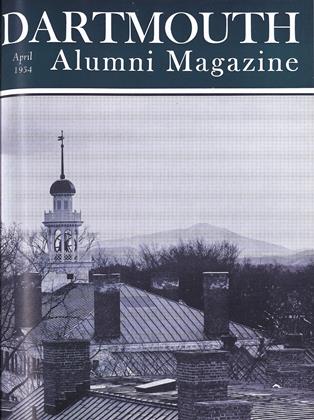THE new directorate of The Dartmouth took over with the issue of March 1 and in its first editorial described the period before spring vacation variously as "pre-schlump" and as characterized by "an all-pervading static aura" and an "atmosphere of calm."
This might have been an accurate surface description, but the impression gained from The Dartmouth's own news columns was that a lot was seething beneath the surface. The student governing groups were rarely more exercised. The Undergraduate Council was about to stage another referendum vote by the entire student body on the question of fraternity discrimination clauses, and as a prelude to this the Vox Populi column was full, public meetings were held, and WDBS supplied broadcast time for panel discussions. The Interdormitory Council adopted a reorganization of dormitory governing committees, designed to enable them to do a more responsible job. and the Academic Committee of the Undergraduate Council was busy polling students and faculty on a proposed two-day study period prior to final exams (shades of 1935-39). Also Commission on Campus Life was busy sounding out student opinion and was sending two-man interviewing teams into the dormitories to ask questions about student eating facilities and about the proposals for freshman dorms and social rooms and resident advisers in the residence halls. Hardly an "all-pervading static aura."
The faculty, used to being sounded out by students and their own committees, had a new experience from the outside when the Alew Hampshire Sunday News sent an inquiring reporter to Hanover to see what the professors thought of Senator McCarthy. A similar survey at the University of New Hampshire the week before produced a unanimous vote against McCarthy, but not many professors were willing to be quoted by name. Dartmouth gave no official sanction to the newspaper's survey in Hanover, but the reporter was of course at liberty to contact faculty members on his own. Thirty professors were interviewed and of this number only four asked that their views be presented anonymously. The Dartmouth tally was twenty-six against McCarthy, one in favor, one neither for nor against, and two no comment.
The Sunday News gave front-page space to the results of the Dartmouth faculty poll, which we consider a great credit to the College both for the faculty's forthrightness and for the views expressed. Editorially the pro-McCarthy paper did not miss the chance to use this grist for its mill. The lone faculty opinion that McCarthy was doing good was described as a "pitifully tiny vestigial trace of an era when thought and expression at Dartmouth really were free, variegated and unregimented." There is plenty of free and unregimented thought at Dartmouth, but it isn't exactly variegated on the subject the Sunday News chose.
 View Full Issue
View Full Issue
More From This Issue
-
 Feature
FeatureAn Introvert at Dartmouth
April 1954 -
 Feature
FeatureADMISSIONS—SCHOLARSHIPS—ENROLLMENT
April 1954 By Robert L. Allen '45 -
 Article
ArticleThaddeus Stevens, 1814
April 1954 By JOHN S. MONAGAN '33 -
 Class Notes
Class Notes1918
April 1954 By ERNEST H. EARLEY, RICHARD A. HOLTON -
 Class Notes
Class Notes1921
April 1954 By REGINALD B. MINER, WILLIAM H. PERRY -
 Class Notes
Class Notes1915
April 1954 By PHILIP K. MURDOCK, MARVIN L. FREDERICK







